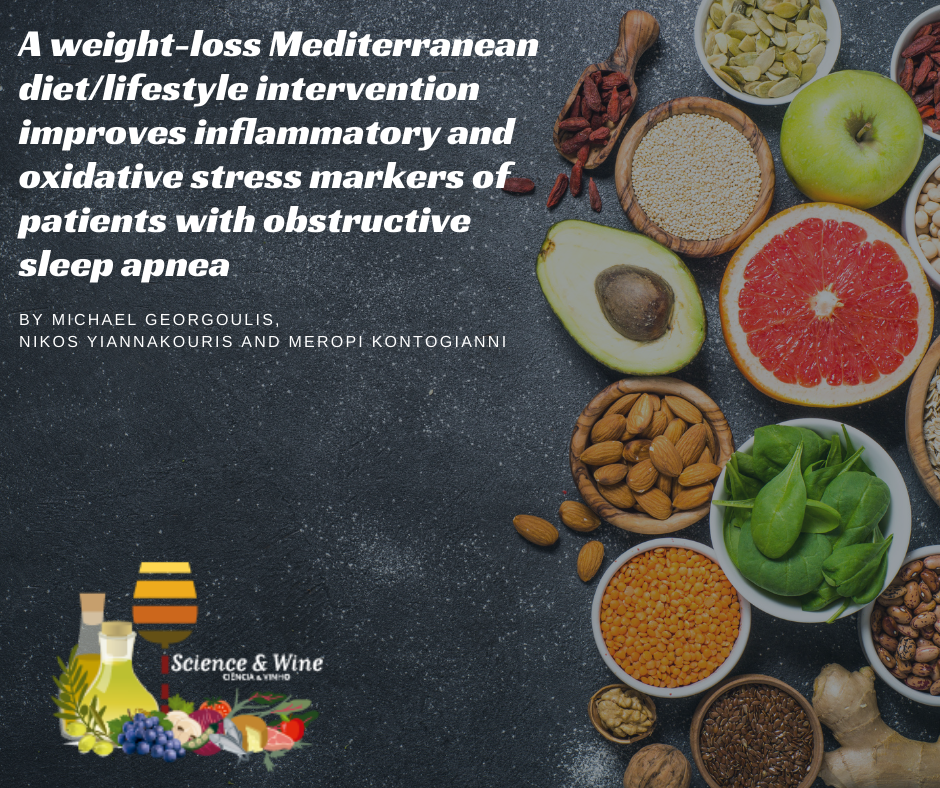By Michael Georgoulis, Nikos Yiannakouris and Meropi Kontogianni
Obstructive sleep apnea (OSA) is a chronic disease characterized by repetitive obstructions of the upper airways during sleep, leading to pauses of breathing, impaired sleep continuity, various daytime symptoms, and low quality of life. Although traditionally viewed as merely an anatomical disease of the upper respiratory system, a growing body of literature demonstrates a strong link between OSA and cardiometabolic disorders (1). Inflammation and oxidative stress typically coexist with OSA and are considered major, and to some extent overlapping, mediators of OSA-related cardiometabolic morbidity (2, 3). Novel theories on OSA pathophysiology also propose that OSA actually represents the respiratory manifestation of the metabolic syndrome in overweight individuals, in whom abdominal fat accumulation and its complications, namely insulin resistance, inflammation, and oxidative stress, combinedly trigger upper airway dysfunction and lead to or aggravate sleep-disordered breathing (4).

Continuous positive airway pressure (CPAP) is currently the first-line treatment for OSA and is offered as standard care to all patients with moderate to severe disease in order to manage sleep-disordered breathing. Although a lifelong daily application of CPAP during sleep can minimize respiratory events, high rates of non-compliance and its doubtable effectiveness in reducing inflammatory and oxidative stress markers limit its value as the sole treatment for OSA (5). On the other hand, the adoption of a healthy lifestyle, including healthy body weight, prudent dietary choices and an adequate level of physical activity, can produce strong anti-inflammatory and anti-oxidant effects (6, 7). However, data on the effects of dietary/lifestyle interventions on inflammation and oxidative stress in OSA remain scarce (8-10).
The aim of our study was to explore whether the addition of a weight-loss Mediterranean dietary/lifestyle intervention to the current standard care for OSA in clinical practice, i.e., CPAP prescription, has an incremental effect on improving inflammation and oxidative stress, over the effect of standard care alone. Our secondary aim was to test whether a Mediterranean lifestyle intervention, combing the Mediterranean dietary pattern, regular physical activity and optimal sleep habits, would lead to additional anti-inflammatory and anti-oxidant benefits in OSA patients compared to an intervention based solely on the Mediterranean diet.
We designed a 6-month parallel randomized controlled clinical trial in a sample of 180 adult (18-65 years old), overweight or obese [body mass index ≥25 kg/m2] otherwise healthy individuals with polysomnography-diagnosed moderate or severe OSA [apnea hypopnea index ≥15 events/h of sleep]. Enrolled patients were randomized to a standard care (SCG, n=62), a Mediterranean diet (MDG, n=59) or a Mediterranean lifestyle group (MLG, n=59). After randomization, all patients were prescribed with CPAP therapy, while patients in the MDG and MLG additionally participated in an intensive 6-month behavioral intervention. The intervention was structured in seven 60-min group (3-5 patients) counselling sessions over 6 months and aimed at a 5-10% weight loss and an increase in the level of adherence to the Mediterranean diet. In brief, patients were counselled towards portion control, correct identification of hunger and satiety and proper meal conditions, and were gradually trained to adopt the Mediterranean diet, i.e., a primarily plant-based dietary pattern characterized by high consumption of olive oil (as the main edible fat), vegetables, legumes, whole grains, fruits, and nuts, moderate consumption of poultry and fish, low consumption of red meat, cold cuts, sweets, and processed foods, and low-to-moderate consumption of wine as the main source of alcohol accompanying meals. Patients in the MLG were given additional goals for adequate physical activity (≥150 min/week, with emphasis on convivial activities that can be maintained in the long-term) and optimal sleep duration (7-9 h/day), and were educated on sleep hygiene. Fasting blood samples and first morning urinary samples were collected from all participants, and inflammatory indices, i.e., plasma high sensitivity C-reactive protein (hsCRP) and adiponectin, as well as oxidative stress markers, i.e., urinary 8-iso prostaglandin F2a (8-isoPGF2a) and oxidized guanine species (oxG), were evaluated pre- and post-intervention.

According to the results, OSA patients in the SCG did not exhibit changes in any of the inflammatory and oxidative stress markers assessed at the 6-month follow-up. On the contrary, patients in both the MDG and MLG experienced a significant improvement in plasma hsCRP levels, which was mainly attributed to weight loss. This observation is in line with the results of previous clinical trials demonstrating the fundamental role of weight loss, achieved through dietary caloric restriction or bariatric surgery, in ameliorating chronic inflammation in diverse overweight/obese populations. Moreover, urinary 8-isoPGF2a, a specific marker of lipid peroxidation, improved only in the MLG. This improvement was evident regardless of changes in participants’ weight status, highlighting the weight-loss independent and synergistic beneficial effects of the Mediterranean diet, adequate physical activity and optimal sleep habits, all important components of the Mediterranean lifestyle, on oxidative stress.
Our findings support that a weight loss Mediterranean dietary/lifestyle intervention can ameliorate inflammation and oxidative stress, both linked to cardiometabolic morbidity, in OSA patients. Therefore, behavioral interventions towards weight loss through beneficial changes in lifestyle habits can be a realistic and efficient plan for managing not only sleep-disordered breathing but also the cardiometabolic manifestations of OSA. The Mediterranean diet in specific could represent the diet of choice for OSA, given its strong anti-inflammatory and antioxidant properties that can resolve the pathophysiology of the metabolic syndrome and improve upper airway neuromuscular control and function. This hypothesis remains to be tested in future clinical trials aiming at evaluating the effects of the Mediterranean diet over other prudent dietary patterns on OSA-related inflammation and oxidative stress, either solely or in combination with other healthy lifestyle practices in the context of the Mediterranean lifestyle.
For more information on this study, please visit: https://link.springer.com/article/10.1007%2Fs00394-021-02552-w

Michael Georgoulis 
Nikos Yiannakouris 
Meropi Kontogianni 

Dr. Michael Georgoulis, Dietitian-Nutritionist
mgeor@hua.gr
Michael Georgoulis is a post-doctoral researcher at the Department of Nutrition and Dietetics of Harokopio University of Athens. He studied Nutrition and Dietetics at Harokopio University and received his MSc degree in Applied Nutrition and Dietetics in 2013 and his PhD Degree (PhD Thesis: “The effect of Mediterranean lifestyle on clinical and biochemical characteristics of patients with obstructive sleep apnea: randomized, controlled, blind clinical trial”) in 2021 from the same University. He has worked on various research projects covering the fields of Nutritional Epidemiology and Clinical Nutrition and his research interest focuses on the association between nutrition and risk of chronic disease, as well as the utility of dietary/lifestyle interventions for chronic disease management, with emphasis on the Mediterranean diet and its effects on the metabolic syndrome and associated pathologies.
Dr. Nikos Yiannakouris, Associate Professor of Biology-Physiology, Department of Nutrition and Dietetics, Harokopio University
nyiannak@hua.gr
Prof. Yiannakouris is a biologist by training (1987) and received a PhD in physiology (1993) from the University of Patras, Greece. Since joining the academic stuff of the Harokopio University he has been working on various aspects of endocrinology and metabolism, and on nutritional genomics. His research interests focus on the role of diet in human physiology and pathophysiology and on the role of genetic variation and nutrition in chronic disease, such as cardiovascular disease. A major part of his work was in collaborative research with the Hellenic Health Foundation, the Nutrition & Genomics Laboratory, Jean Mayer-USDA, Human Nutrition Research Center on Aging at Tufts University, Boston, USA, and the Centre for Cardiovascular Genetics at University College London, UK. He has published >70 articles in leading academic journals and edited volumes, and he is highly cited in his scientific field (>3,500 citations; h-index=28). He has been co-investigator in a number of research projects funded by the European Union, the Greek State and private foundations, and has given academic lecturers in several national and international conferences.
Dr. Meropi Kontogianni, Associate Professor of Clinical Nutrition, Department of Nutrition and Dietetics, Harokopio University
mkont@hua.gr
Prof. Kontogianni holds a degree in Nutrition and Dietetics (1998) and a PhD in Applied Nutrition & Dietetics (2004), both from Harokopio University. From 1998 until 2005 she worked at the Laboratory of Nutrition and Clinical Dietetics at Harokopio University as a Research and Teaching Assistant and during the period 2004-2009 as a Clinical Dietitian in the General University Hospital of Athens “Laiko”. From 2009 belongs to the faculty staff of the Department of Nutrition & Dietetics. Her research interests focus on: a) the contribution of dietary patterns (with special focus on the Mediterranean diet) in the prevention and treatment of chronic non communicable diseases and b) the assessment of nutritional status in clinical conditions and its impact on morbidity. She has participated in 14 funded projects from national and European resources, she has 84 publications in peer review journals (>2,900 citations) and an h-factor of 26.
References
- Carneiro G, Zanella MT (2018) Obesity metabolic and hormonal disorders associated with obstructive sleep apnea and their impact on the risk of cardiovascular events. Metabolism: clinical and experimental 84:76-84.
- Unnikrishnan D, Jun J, Polotsky V (2015) Inflammation in sleep apnea: an update. Reviews in endocrine & metabolic disorders 16 (1):25-34.
- Lavie L (2015) Oxidative stress in obstructive sleep apnea and intermittent hypoxia – revisited – the bad ugly and good: implications to the heart and brain. Sleep medicine reviews 20:27-45.
- Vgontzas AN, Gaines J, Ryan S, McNicholas WT (2016) CrossTalk proposal: Metabolic syndrome causes sleep apnoea. The Journal of physiology 594 (17):4687-4690.
- Jullian-Desayes I, Joyeux-Faure M, Tamisier R, Launois S, Borel AL, Levy P, Pepin JL (2015) Impact of obstructive sleep apnea treatment by continuous positive airway pressure on cardiometabolic biomarkers: a systematic review from sham CPAP randomized controlled trials. Sleep medicine reviews 21:23-38.
- Vetrani C, Costabile G, Di Marino L, Rivellese AA (2013) Nutrition and oxidative stress: a systematic review of human studies. International journal of food sciences and nutrition 64 (3):312-326.
- Galland L (2010) Diet and inflammation. Nutrition in clinical practice: official publication of the American Society for Parenteral and Enteral Nutrition 25 (6):634-640.

